My Dear Alice

Chapter 8: 1897 – Daisy Elliott bicycles the Alps & Twilight Park transitions
(Daisy Elliott bicycles the Alps & Twilight Park transitions)
Daisy invites Alice to “read between the lines” while Alice meets Gertrude Tate, who will become the love of her life.
Image attributions: (HRT) Historic Richmond Town archive; (AAH) Alice Austen House Museum collection.
1895 Daisy Elliot posing for Bicycling for Ladies book
Demonstrating how to carry a bicycle. (HRT)
1895 Violet Ward & Daisy Elliott
On the set for Bicycling for Ladies book illustrations. (HRT)
c 1895 Violet Ward & Daisy Elliott
Posing with their wheels. (HRT)
1895 Daisy Elliott posing for Bicycling for Ladies book
Demonstrating coasting. (HRT)
April 27, 1897 parade to dedicate Grant’s Tomb
Alice accompanied Violet & her father, as referenced in a letter in this episode. (AAH)
1898 headline for article about Daisy Elliott’s bicycling excursion.
Front page New York Times, November 13, 1898.
June 26, 1897 letter from Daisy Elliott
Written over 10 days on the steamship. (AAH)
Daisy Elliott’s steamship
The German ship from which Daisy wrote Alice during the 10-day voyage.
c 1897 view from Clear Comfort
Demonstrating the proximity to passing vessels. (HRT)
July 30, 1897 letter from Daisy Elliott
Written from the Tyrolean mountains in Austria. (HRT)
July 31, 1897 postal from Switzerland
Sent to Alice around the time she met Gertrude Tate. (AAH)
June 19, 1897 letter from Daisy Elliott
First letter, as read in this episode. (AAH)
August 1, 1897 postal card from Switzerland
Forwarded from Clear Comfort to Twilight Park. (AAH)
August 1897 Twilight Park group
Gertrude Tate (far left) next to Trude Eccleston. Tate’s mother, back, right, in black. (AAH)
August 1897 Twilight Park group with Alice & Gertrude
Earliest known image of them together – Alice squeezed in alongside Gertrude. (AAH)
1835 engraving, Catskill Mountain House
Same location as Austen’s portrait of Tate. (HRT)
August 1897, Gertrude Tate
Viewing the Hudson Valley from a perch on a Catskill Mountain. (see notes) (HRT)
August 1897, Gertrude Tate dances
Part of a photo album sequence. (AAH)
August 1897, Gertrude Tate dances
Part of a photo album sequence. (AAH)
August 1897 Gertrude Tate dancing
Animated sequence of nine photographs. (AAH)
August 1897, view of Ledge End Inn
Group including Trude Eccleston at the cottage where they stayed. (HRT)
August 1897, group at Santa Cruz Falls
Gertrude Tate center, in profile, dressed in black – Twilight Park. (HRT)
July 2022, Santa Cruz Falls
Photograph by Pamela Bannos.
August 25, 1897, letter from Trude Eccleston
Writing about their new friend, Gertrude Tate. (AAH)
August 1897, Gertrude Tate dancing on rock
Alice Austen at left. Group at Twilight Park. (HRT)
Twilight Park
Engraving on postal card.
July 2022, Twilight Park
View of the Hudson Valley. Photograph by Pamela Bannos.
c 1900, Union Chapel
Twilight Park postcard.
July 2022, Union Chapel
Twilight Park. Photograph by Pamela Bannos.
July 2022, Kaaterskill Falls panorama
Near Twilight Park. Photograph by Pamela Bannos.
July 2022, Kaaterskill Falls, rocks & bathers below
View from lookout. Photograph by Pamela Bannos.
Santa Cruz Falls panorama
July 2022 photograph by Pamela Bannos.
July 2022, Twilight Park
Dripping rocks near the Santa Clara Waterfall. Photograph by Pamela Bannos.
July 2022, Twilight Park gazebo & Santa Cruz Falls
Photograph by Pamela Bannos.
July 2022, View from Twilight Park
View of the Hudson Valley from Twilight Park. Photograph by Pamela Bannos.
Opening music …
[Daisy Elliott]
People over here seem to think us curiosities in our bicycle dresses, occasionally it has been embarrassing. The other night on the train a young peasant man was especially interested in us; he began to talk and ask questions, and as it is the custom of the country to converse with one’s travelling companions, we began by politely responding.
He began by inquiring about where we came from and customs over in America; then about where we had been and where going; so far, all right, but when particularities as to whether we had husbands, as to how old we were and such little things, we began to think it time to sit on him. He didn’t seem to understand, and pityingly remarked to our fellow travelers – “they don’t understand.”
After he and most everyone else had left, we got acquainted with a nice, strong young peasant woman, and when she left us, she was so sympathetic and friendly that she shook hands with us both very cordially.
Theme music …
[Narrator]
That was Daisy Elliott, writing from Europe, while on an outing we’ll be hearing more about in this episode of My Dear Alice, a podcast series about 19th century photographer Alice Austen.
Chapter 8:
During the busy year of 1896, after Alice Austen finished making two series of photographs specifically for publication – one as a collection of mounted prints, and the other to illustrate articles that Violet Ward wrote for Harper’s Weekly and Scientific Monthly magazine, she kept traveling and photographing.
Austen’s Street Types of New York were published in Albertype, a process also known as photogravure, a hybrid of photography and printmaking that allows for many duplicates. It is unknown how many of Austen’s Street Type sets were published, but the portfolio is in the collection of the Museum of the City of New York, the George Eastman House in Rochester, and other museum collections, including two sets at the Alice Austen House Museum, and a beat up set at the University of Miami as part of Ralph Munroe’s archive.
On January 2nd, 1897, Austen received a letter from Adolph Wittemann, on letterhead that identified him as the …
[Adolph Witteman]
“Publisher of the Albertype Company’s American Views – souvenir albums, etc.”
[Narrator]
When I saw that letter, suddenly things started making a different kind of sense to me in respect to Alice Austen’s range of photography subjects and series of images that she compiled. Wittemann also lived on Staten Island. The Albertype Company published souvenir city booklets and also albums of other themes.
In the summer of 1891, Austen photographed a series showing the Bayhead Life Saving Station crew in action – The Albertype company had earlier published a similar set of images in their Atlantic City view book. In 1892, she made a set of photos of Boston, and also Harvard on its Class Day, including a portrait of a young man in his dormitory room – there are letters in the collection that show the conversation leading to that photo shoot. The Albertype company also published around two-dozen college photo books. By that time, the company was also making promotional booklets for factories.
Which brings us back to Austen’s 1892 New Brunswick factory visits, when she was staying with her Aunt Nellie, who would write after her visit…
[Nellie Austen]
Love to all and come again when you can; more factories waiting to be appreciated.
[Narrator]
An 1893 brochure shows Wittemann’s company inviting anyone to send them photographs for publication, stating:
[Adolph Witteman]
“We offer to prepare, print, bin and furnish complete an Albertype Souvenir of views of your town, city, establishment, country or section, or a catalogue, pamphlet…, etc.,”
[Narrator]
Adolph Wittemann issued a view book of Chicago at the end of 1892 in anticipation of the World’s Fair there, and there was another collection of photographs related to the Fair that I stumbled onto while following Alice Austen through her travels and studying her photographic strategies. A book called Street Types of Chicago was issued in 1892 and would have been available during the Columbian Exposition. It showed posed studio character studies, including an organ grinder and a letter carrier.
Austen photographed her first “street type” in March 1894, eight months after her Chicago trip, and she refined her approach until settling on the distance and framing that was consistent two years later in her published set of images. In comparison with the theatrical (and racist) character studies in the Chicago publication, Austen’s subjects feel authentic in their representation. Her direct on-the-street portraits were unique for that time, giving a glimpse of street life and also demonstrating her rapport with her subjects. Still, it’s not clear what her intention was in compiling, copyrighting, and publishing the portfolio at the end of 1896.
Adolph Wittemann’s letter was an offer for Alice to work for him.
[Adolph Wittemann]
Would you possibly consider a trip to St. Augustine, Florida, to handle my Florida books for the winter season on consignment?
I would pay your passage, but the rest of the expenses and renumeration you would have to make out of your sales.
The season lasts till middle of April.
[Narrator]
Austen apparently rejected Wittemann’s offer to be a salesperson for the Albertype Company, which would have had her spending winter alone in Florida. By early spring, she was back to photographing at the Quarantine Station as commissioned work for New York’s Health Officer, Dr. Alvah Doty.
+++++++
As we enter 1897, evidence of Alice Austen’s activities is slim. She was in New Brunswick, New Jersey, at the end of January, visiting Bessie Strong – her Uncle Pete and Aunt Nellie had moved to Brooklyn. After teaching chemistry at Rutgers University for 14 years, Peter Austen was now a popular public lecturer and teacher at the Brooklyn Polytechnic Institute.
The next letter from 1897 is a Valentine – and it is the only Valentine note in the collection – not counting Henry Gilman’s from 1893:
[Henry K. Gilman]
Valentine’s Day has got around again, I hear, and as a reminder of it, I got Maria to send you a little trifle today, which I hope will reach you safely and prove both acceptable and useful.
[Narrator]
This year’s Valentine comes from Daisy Elliott, and it is striking to see Elliott’s attention shift from Violet to Alice:
[Daisy Elliott]
My dearest Love,
In sending you this Valentine, I must apologize for the want of originality in my selection; but I believe you will take it in the spirit in which I send it. Ever since I have had mine, I have felt that you ought to have one too, and naturally I prefer you should have it from me.
You know that I love you darling; there are many things I think of that I would like to do for you, yet there is so little that I really can.
Whenever there is anything I could do, and don’t, please let me know; because there is nothing that gives me more true pleasure, than doing for all I love, as I do you.
You have brought me so much happiness at a time when I could see nothing but misery, that nothing I can ever do for you will ever equal it.
I would like you to find as much happiness – come time I believe you will, darling.
Always faithfully, Yours, Daisy.
[Narrator]
Something was up with Violet Ward, who earlier, Daisy had referred to as “my Violet.” Violet obviously had a strong personality, and an intensity that is reflected in her writings, but it’s impossible to know what went on between all these personalities outside of the photos and letters.
In April, Violet invited Alice to join her to see the parade leading to the dedication of Grant’s Tomb in Manhattan. Violet’s father had been a Civil War General and had been friends with Grant. Her last sentence reads cryptically…
[Violet Ward]
My dear Alice –
We are to see the parade from a stand at 115 Street. I want you to go with us.
As soon as the tickets come, I will write you particulars.
You must do the heavy Photographing. We will take our lunch.
So sorry to miss you. You see, I am still shaky.
With love, Violet
[Narrator]
I’m not sure what she means when she says she’s still shaky.
In the next few weeks Alice Austen went to Boston and her mother wrote that Frederic Jones, the piano tuner had come by to tune the piano that he so patiently helped Alice choose three years earlier, and we should all be happy to hear his report:
[Alice Cornell Austen]
Jones the tuner came yesterday and tuned the piano. Katie gave him his usual tea and told him you were in Boston and I in the City. He said the piano was in very good condition. I said to Katie that showed your care of it.
[Narrator]
Then a few days later, Austen’s mother wrote again:
[Alice Cornell Austen]
A messenger came from the Boating Station with a handful of papers for you, a check from Doctor Doty for 20 dollars, a duplicate unfilled sheet, and also your bill for the Photographs.
[Narrator]
And then…
a month later, as Austen was between traveling destinations, the first letter arrived from Daisy Elliot that would launch an ongoing correspondence during her summer trip abroad. She wrote from the steamship on her way to Europe, two days after leaving New York:
[Daisy Elliott]
Alice dear,
Why aren’t you here! It is simply heavenly – such perfect days and such a beautiful sea. Those who are sick so far would be so if ashore, at the mere thought of water.
I have thought of you and of how you would enjoy it; yet how you would fume because the ocean didn’t show how bad it could be.
I am as frisky today as a cricket and would willing, for the entertainment of the passengers, turn three somersaults in midair before returning to the deck!
Please imagine my surprise and delight the second day out at receiving your special delivery letter! It went to my throat and knotted it all up – and then – I enjoyed it; thank you dear for sending it – I didn’t expect it, and I like the photos so much and the clover, too.
[Narrator]
Alice is speaking the language of flowers again, just has she had sent Trude Eccleston “forget-me-nots when she went off to Salt Lake City, this clover signifies good luck. Daisy was on her way to Bremen, Germany, with the ship dropping off some passengers in Southampton, England. She would be at sea for ten days. She continued her letter the next day:
[Daisy Elliott]
Sunday, June 20.
Another fine calm day.
I told you, I think, that I was down on the list at one time to room with a Miss Ward. How thankful I am it didn’t turn out that way; the resemblance is absolutely striking – I know they must be related. Perhaps I shall find out; it makes me sick.
[Narrator]
Clearly, something had happened between Daisy and Violet Ward, and Daisy is redirecting her considerable attention to Alice:
[Daisy Elliott]
I have thought of you today and wondered how you have passed the day – I hope in the old, pleasant way.
We were wakened this morning by the band – very pretty way, isn’t it? We have music three times a day. Last night at dinner they played in a very pathetic way – you dear, I do wish I were there playing with you now!
The first bugle was sounded.
That means dress for dinner – so here goes – red silk waist.
[Narrator]
Daisy provides play by play of her voyage as she reiterates Alice’s temperament:
[Daisy Elliott]
Monday 21st June : Another smooth day. Wouldn’t you fume at the continued serenity! It is simply stunning.
My tendon is beginning to make itself felt again, regardless of the bandage – must try to follow your instruction and use hot water again.
[Narrator]
Day Six:
[Daisy Elliott]
Wednesday. This continued smooth sea and fine weather is marvelous.
I have frequent impulses to sit down and write to you. Yet, it is so very one sided, and unsatisfactory – I wish you were here to tramp with me and explore the ship and to watch and discuss people etc, etc.
But I presume you are having a lovely time at Staten Island by now – In the early morning a telephone, or a note, or a call – then golf or photography; then lunch, and afterward a nice chat, followed by an afternoon’s drive, and possibly even the night on the hill – I can see it all so well. Be as happy as you can; and I guess you know how to be, as well as I.
Tell me about your days, if you will. I hope you won at the golf tournament last Friday.
[Narrator]
Alice and her group had joined the Golfing craze by this time, and most of the sporting references were now in regard to bicycling and golf.
[Daisy Elliott]
How I wish I could write something really worthwhile. Something you would feel glad to get from me – there is a good deal more between the lines than in them. Read as much as you care to, and you will not be mistaken…
[Narrator]
This is the only reference in the letter collection that suggests there is a next level of meaning in the letters that never speak of desire – other than Trude Eccleston’s frivolous flirtations. Daisy suggesting that Alice read between the lines of her correspondence spoke volumes to me.
[Daisy Elliott]
Dear, how thankful I am for what you have given me – don’t resist my giving to you – I don’t offer my love and friendship to many as I have to you. Those who have it know how to steadfast it is.
I want yours – what I have had of it shows me that it is worth having – working for – please don’t write any of those slighting things you have insisted upon flinging at me now and then – they are too suspicious and cynical for utterance by anyone who has any faith in herself.
[Narrator]
It seems that Alice may have been uncomfortable with some of this…
[Daisy Elliott]
Well, perhaps you don’t like me to write like this – do you prefer that I should leave it unsaid? Answer – you can help my saying that I love you, but you cannot prevent the love itself – for I do, and I am glad of it – if you’re not, you can say so, and I will creep back into my shell and shut it up as tight as even you could wish.
[Narrator]
Daisy ended that letter very abruptly…
[Daisy Elliott]
Thursday, June 24th morning
The very thought of the above shut me up yesterday.
[Narrator]
She continued her diaristic descriptions for the next couple of days, ending as they approached Southampton…
[Daisy Elliott]
Today there is a fog. We sighted land last night and the Southampton passengers will be landed today.
I shall write you again soon after landing. I hope I shall hear from you soon.
2pm Saturday –
Here we are, opposite The Needles, and off go the letters.
Good bye dear
[Narrator]
The letter had gone on for each of the ten days at sea, with Daisy mailing it at the first European port. She picked right up again the next morning…
[Daisy Elliott]
North Sea – Sunday Morning, 27th June
Alice dear,
It is rather lovely this morning for more than half the passengers left yesterday when we reached Southampton – my friends Anna Marshall and Mrs. Underhill have gone, and I miss them more than I expected to.
How I dread changes. Although I have travelled so much, it is with something akin to homesickness that I part with one place or with people I have grown accustomed to. I am rather dependent on my independence, after all; yet most everyone thinks I am so self-reliant – you know as well as anyone the true fact of the case, don’t you, you poor dear? I trust you don’t mind my having imposed so much and taken so much from you what should I have done these last six weeks without you.
[Narrator]
Another clue that her relationship with Violet had soured… and Daisy’s attention shifted to Alice.
[Daisy Elliott]
June 28th
Bremen has no special attractions, but it is a very quaint German town with such lovely, picturesque buildings. I want to Snap a lot of them, but the streets are too narrow to get a good point of view with the camera.
I suppose you would be stopping some of these queerly dressed women or elegant officers and asking or taking unceremoniously their picture.
I am terribly tired – Good night, dear.
[Narrator]
Daisy’s next letter is dated July 16th, more than two weeks since she landed in Bremen. She had also written on July 10th, but all that remains is the envelope that was forwarded to Alice, who was then in West Hampton, visiting family. And the “postal” which is a postcard, that Daisy refers to in this next passage is also gone.
[Daisy Elliott]
Alice my dear,
I am beginning to be very home sick for a letter! It is a month since I saw you last and all I have had is the letter at Bremen.
I sent you a postal on the Eve of our starting from Dresden on a four- or five-days wheeling tour, but how “many a slip between the cup & the lip”!
That night I went out to test my wheel and came back bump-edity bump, on a ruptured tire!
The next morning, I started out before breakfast to find a man to mend it – went from one place to another. Finally took a cab and drove, and at last found a nice blacksmith, bless him, with whom I left the wheel while I went for breakfast. It cost me $1.25.
In the afternoon we took the train, but before we arrived at our destination, it was pouring!
In addition to this, I succeeded in losing a Twenty-Mark gold piece – five dollars! We are now travelling third class.
[Narrator]
Although Daisy Elliot had traveled to Europe yearly, this particular trip is noteworthy because she had brought her bicycle and would be wheeling across Europe, beginning in Germany, continuing on through Austria, Italy, Switzerland, and France. Basically, Daisy and her traveling companion bicycled across the Swiss, Italian, and French Alps.
Daisy was traveling with Caroline Lawrence, one of the women pictured with her when Alice photographed at the Berkeley Gymnasium. They had traveled together before and would continue to for many years. Daisy only ever refers to her as Miss Lawrence.
[Daisy Elliott]
Yesterday we had to waste a whole afternoon looking up a trunk we had sent ahead to meet us at Nuremburg. I tell you, baggage is a perfect nuisance, and I am going to see if I cannot get along without anything but a pack on my back.
Today I saw a dog like Tim; even a little thing like that sends the blood from my heart to my fingertips and back again –
Oh, Alice, don’t desert me. You are a great comfort. I should be lonely through some days if I couldn’t write to you, or if I didn’t have some words ¬to look forward to from you.
I hope you are happy now – I don’t expect it for myself. I must not write more. Good bye dear; as ever, with love,
Daisy
[Narrator]
Daisy’s letters seem to have taken around ten days to arrive in New York, and I assume it took longer for Alice’s to reach her, as she needed to go to a central place to pick them up. Alice had returned Daisy’s last letter while at Westhampton, where she had received it when it was forwarded there. That was Daisy’s last letter to arrive back at Clear Comfort before Alice left for the Catskills, where this next letter would be forwarded.
[Daisy Elliott]
Alice, dear, at last a letter from you! I knew I wanted it very much but didn’t realize how much until it was really here. It is funny too, it had the same effect as being with you has, you know how quieting that is. I really have been pretty home sick, and your letter has given me a new start.
It may reassure you, and encourage you to do it again, to know that this separate sheet in your letter is already destroyed. I read it over carefully twice and destroyed it without even keeping it overnight.
I am very sorry, though, that things are not better for you; it is entirely incomprehensible and outside the borders of reason. The more I think of it, the worse it seems – I cannot understand it or reconcile myself to her way of doing. It is unheard of, and it seems to me so unnecessary. Is it not better by this time? I have not had a single word, and of course have not written. I can do nothing more. It is the cruelest experience I have had in my life.
[Narrator]
I have no idea what Violet may have done to Daisy and Alice that would have been such a secret that Daisy had to destroy the letter, but she just as quickly returns her attention to Alice…
[Daisy Elliott]
I am glad, dear, that you can have such a good time at West Hampton and hope you will fill in all your summer as well; in the Autumn we can have some more good rides together. I look forward to them with much anticipation.
The other day we were caught in a hard rain – sought refuge in a peasant’s cottage for an hour but ventured out too soon and got drenched and covered with mud! Sent my dress to the tailors, and it came out like new; it took me an age to clean my wheel. I took off the chain guard to get at the chain. I hate that guard and am sorry my dress is not short enough to dispense with it. People couldn’t stare more if I wore only my light blue checked knickerbockers!
[Narrator]
Trudie had written to Alice on the same day from Twilight Park in Haines Falls, New York, where she would soon be joining her.
[Trude Eccleston]
My dearest Alice –
There’s been nearly two weeks of rain & we are all nearly desperate
There is quite a jolly crowd here & we make a dreadful noise & try to have a good time – I have had one walk only & that was this morning we returned home in the pouring rain, disgusted.
There are now two or three quite jolly girls here & a German man that I have on a string at present. Also, an artist who is young but quite good fun so we manage to whoop things up a little.
[Narrator]
Three days later she wrote again…
[Trude Eccleston]
My dear Alice –
Will you bring some more of my songs up to me when you come? I want those two books of Lassen & one of Meyer-Hellmund. Will you also pick out some more old Jesuit Songs like “Oh Promise Me” & some of the popular songs – Louisiana Lou, “Mon Cher” & “I want you my Honey” etcetera…
I am awfully cheeky to ask you to bring all that, but I know you will enjoy it too.
[Narrator]
And again, Daisy wrote on the same day – although the ten day lag separates them…
It’s striking how the rain is disrupting everyone’s summer plans.
[Daisy Elliott]
My dear, how is life with you?
I hope somewhat more cheerful than we are having. In fact, now, in this beautiful water-soaked country. We are waiting on the border yet, before returning into the Engadine in Switzerland, but we don’t care to go out of our way any longer to see it in the rain.
[Narrator]
And then she sent a postcard, which Alice’s mother forwarded to the Twilight Park resort where Alice had now been for a week.
[Daisy Elliott]
A fine day & a glorious ride through the mountains.
About 32 miles: ten of which we walked.
Have now cut away from railroads and must depend upon our feet or our wheels. It is very wild, magnificent scenery all day long.
[Narrator]
Daisy continued to write, chronicling her bicycle treks through the mountains. And her walks through areas where they could not ride.
[Daisy Elliott]
… up and up, and down all day – we went only 32 miles, but climbed two mountains, and the descent of one was so precipitous and winding that we had to walk. That brought us down into a deep, narrow ravine, with high mountains towering way above us.
[Narrator]
I’m struck by the hardiness of these Victorian women. And I want to point out that Daisy was 40 years old at this time, and her companion Miss Lawrence was about to turn 45.
[Daisy Elliott]
We probably walked ten miles in all, but I never had a lovelier walk.
This morning we had a 2-hour ride from Martinsbruk to Tarasp.
We spend the day here and at five, ride ten miles to our next lodging place. Shall in that way get the lovely sunset glow in the mountains.
It is all rather hard on our shoes, and Miss L. had some blisters.
I think of you often and wish you were here to enjoy it too. Someday however, you must come. I mail you a postal every now & then – hope you don’t mind.
When I am en route it is hard to do more than that.
As ever, Daisy
[Narrator]
Meanwhile, Alice’s mother was now writing her at Twilight Park and she relayed an amusing American bicycling story:
[Alice Cornell Austen]
There was an account in the paper yesterday of a young man who applied an electric motor to his wheel in an ingenious manner. He started off at a tremendous pace, could not control it in the least, ran down everything he passed; nearly killed a young lady on a wheel.
The police went for him, but he passed them like lightning, and finally ran into a heap of earth, where he was flung off. The bike continued working on top like a mad thing, till the electricity was spent.
Do eat all you can: milk, chicken, rolls and everything.
[Narrator]
And again, a cryptic reference to Violet Ward:
[Alice Cornell Austen]
I suppose Trudie was relieved at not seeing poor Violet. I have not heard of her.
Do be careful on the ledges and rocks. I went over to Haines Falls once and thought it a ticklish place.
Goodbye my dearest, Your Mama
[Narrator]
And then Daisy, again…
[Daisy Elliott]
We walked over the Bernina Pass with our wheels – the most glorious walk I ever took. A fine glacier in sight all the way up with the rugged peaks on all sides.
We literally dropped into Italy – down, down, down. The bottomless pit could not be much further. That day I found some new muscles, and I developed them!
We stopped in the little town when the market was ahead in full swing; such a squeaking & squalling & braying & screeching – man & beast all in chorus.
When we appeared upon the scene, we seemed to be the chief feature of the performance; the whole town stood still to stare.
Once I left Miss L. for a moment while I went for some fruit. When I returned, she was the center of an admiring crowd who stood in a circle around her.
But they are peaceable and picturesque, and I guess amuse us as much as we do them; “a fair exchange is no robbery.”
[Narrator]
And more…
[Daisy Elliott]
Yesterday we walked over from Italy! My biggest feat! Twenty miles climb, pushing the wheel ahead all the way.
Before beginning the last three miles we were pretty well done up, and decided – as we braced up on tea, toast & butter, cheese & honey – that we would make a desperate effort and reach the top, then stop for the night instead of pushing on to St. Moritz.
But as we climbed, the air simply acted like champagne. We grew brisker & brisker; and when we gained the summit, my trace of fatigue had disappeared, and we took the remaining 12 miles awheel, without the least trouble.
Today in spite of the fact that I, particularly, ought to feel a wreck, we are both as gay as crickets and ready for our next pass.
Alice I simply pine for letters. I have had just two from you. I did not get any here as I hoped, which means nearly a two week wait till we reach Lucerne.
Well, I have learned to wait – but I don’t like it!
[Narrator]
On August 13th, Daisy received a letter that Alice had sent when she was still in West Hampton.
[Daisy Elliott]
At last letters! –
One from you from Westhampton (the 2nd). I saved it till the last and then devoured it, and it was keen pleasure. I realized when I put it down at the end, how completely it had taken hold of me and carried me back to you. It makes me want more.
I am glad you are enjoying your visit at West Hampton and that you managed to get in some riding.
[Narrator]
By the time Alice received this letter from Daisy, she had met someone who would change the course of her life.
[Daisy Elliott]
It pleases me very much for you to speak of our rides in the Autumn – we must have some good ones – perhaps in Jersey. Look over your road book and plan a good one for about the middle of September- we might go as far as Trenton anyway.
[Narrator]
And, as Daisy was hoping to spend more time with Alice on her return, she reiterated the fun routine that had been established by Alice’s grandfather decades earlier as ships passed by Clear Comfort’s front door, also indicating that Alice had waved her off a few weeks earlier:
[Daisy Elliott]
You know, I expect to sail for France on September 5 by the Spree, and she is due in New York about the 10th or 12th. Are you to be at home then? And, if so, may I look for another wave?
We sail three weeks from today.
By the way, don’t you want to do something for me? Send a letter to the steamer that I may get it just as I sail?
Then you might send me a “hallo” at Quarantine!!
Nothing like asking for what you want.
[Narrator]
Confusing the timeline of communication, as well as showing that at least some of the weirdness with Violet had passed, and that Alice had written to her from Twilight Park, Violet also wrote Alice at the resort, sounding characteristically odd.
[Violet Ward]
My dear Alice –
If you are not watered down passed the eyes, you may be glad to receive a line from me.
I was delighted to hear from you and regretful that I could not enjoy all the fun of scrambling with you.
Carrie is away and I hope will stay away for some time.
I jog along about the same and manage to keep in pretty fair shape.
We are neither hot nor cold, and the weather and country are delightful.
Love to Trudie and get all the bracing you can.
With love, V.
[Narrator]
A communication from the Catskills had finally reached Daisy. On August 21st, as Alice was preparing to pack up and leave, Daisy received her letter from August 9th, a few days after she had arrived. In the interim, Alice had met Gertrude Tate, the woman who would become her life partner. In a picture taken right before the earliest known photo of the two of them together, Alice shot a group portrait of twelve people, including five men, Trudie Eccleston who sat beside Gertrude Tate, Tate’s mother and her young sister, and two dogs. In the next photograph, after a slight shuffling of people, Alice had squeezed in to sit alongside Gertrude. Trudie was now in the back row.
Alice had not received a letter from Daisy since her first days at Haines Falls, and would not receive Daisy’s subsequent six letters until she returned to Clear Comfort at the end of August.
Alice had been photographing small groups on their various outings. Gertrude Tate is recognizable in the photos because, like her Mother and ten-year-old sister, she is wearing black in mourning for her father who had died in February.
Gertrude loved to dance, and Alice photographed her in a series of eight pictures doing some sort of free-form jig. Alice was clearly charmed. And in one stunning photograph on another day, Gertrude stands in profile, alone at a precipice, looking out over the distant valley below.
Sometime around when that scene occurred, and weeks after Alice’s letter, Daisy wrote:
[Daisy Elliott]
Alice my dear,
Your letter from Haines Falls of August 9th, has reached me. What a good time you seem to be having there. I wish I could take some of those solitary walks with you – it is great fun trying to follow blazed trails in the mountains – rather exciting, too – I have done more or less of it in the White Mountains.
[Narrator]
And then she sort of mocks the strolls Alice has been taking with the group:
[Daisy Elliott]
When you are fond of tramping, how awfully slow a conventional summer resort stroll is – those when people go out for an hour and saunter for a couple of miles and come home thinking they have accomplished great things.
[Narrator]
Alice would not have received Daisy’s letter until well after she had returned home; but just days after she wrote it, Trudie also wrote Alice who had since left Twilight Park for Bayhead, New Jersey.
[Trude Eccleston]
My dearest Alice – we all miss you dreadfully, can’t you come back?
[Narrator]
Trudie had given Gertrude Tate a nickname.
[Trude Eccleston]
The “Chipmunk” & I are really writing letters together in the new writing room –
We have been very subdued since your departure.
Two of us cannot keep up such a pace as we were going there for a while, without succumbing to nervous prostration.
We must keep track of the Chipmunk, she is a great girl – She sends lots of love to you & says she misses you more than she can say.
[Narrator]
Daisy continued to write Alice, her letters piling up at Clear Comfort.
+++++++
[Narrator]
In the next episode, we catch up with Julia Martin, whose 87 letters dominate the letter collection as they also provide a parallel history:
[Julia Martin]
My dear Alice, What has become of you where are you, & why do you not write to me?? It is ages since I have heard from you. I wrote you weeks ago. .
[Narrator]
And as the letters in the collection come to their end, Alice emerges with Gertrude Tate.
+++++++
[Narrator]
This episode featured the following voice talent in their order of appearance:
Kristen Waagner, Charlie Niccolini, Kylie Boyd, Benjamin Jouras, Madeleine Bagnall, Reute Butler, Rachel Hilbert, and Liv Glassman.
Sound editor: Kendall Barron
Original music by Nicolas Rosa-Palermo.
Other music from FreeSound, MusOpen and other public domain and attributed sources – links are in the website that accompanies this podcast, where you’ll also find images of some of the letters and photographs that are referred to in each episode. That’s My Dear Alice dot ORG.
Cast in the order of appearance:
Daisy Elliott: KRISTEN WAAGNER
Adolph Wittemann: CHARLIE NICCOLINI
Nellie Austen: KYLIE BOYD
Henry K. Gilman: BENJAMIN JOURAS
Violet Ward: MADELEINE BAGNALL
Alice Cornell Austen: REUTE BUTLER
Trude Eccleston: RACHEL HILBERT
Julia Martin: LIV GLASSMAN
Voices in the introduction (in order):
Ella Stevens
Maya Slaughter
Ella Stevens
Kylie Boyd
Natalie Welber
Graham Goodwin
Madeleine Bagnall
Efren Ponce
Cristina Bragalone
Reute Butler
Ella Stevens
Benjamine Jouras
Kristen Waagner
MUSIC FILES USED IN THIS EPISODE:
Theme music by Nicolas Rosa-Palermo: Interpretation of the 1889 Santiago Waltz
Musopen website:
All music licensed under Creative Commons Public Domain Mark 1.0 license
1830: Frederic Chopin, Nocturne in b flat minor, Op. 9 no. 1, played by Eduardo Vinuela,
1835: Frederic Chopin, Waltz in B minor, Op. 69 no. 2, played by Olga Gurevich.
1835: Frederic Chopin, Waltz in A flat major ‘Farewell,’ Op. 60 No. 1, played by Olga Gurevich.
1860s-1880s: Johann Strauss Jr., Waltz Medley, performed by the US Air Force Band.
Freesound website music:
Avnonsen: Aksamin Vakti Gecti (licensed under CC Attribution 0 license)
Herman Ruzh – Shostakovich second waltz on guitar (licensed under CC Attribution 0 license)
Adobe Stock:
Who We Are, Audio standard license, via Adobe Stock
First Snow Valse, Audio standard license, via Adobe Stock
In this chapter, Daisy Elliott invites Alice Austen to “read between the lines” of her correspondence, and Austen meets Gertrude Tate, who will become the love of her life.
Daisy bicycles across the Alps, writing Alice more than a dozen letters, beginning on her steamship voyage. The lag in delivery intersects with Austen’s Twilight Park visit, and the letters pile up at Clear Comfort as Gertrude Tate enters Alice Austen’s life, changing it irrevocably.
Daisy’s letters include allusions to a rift between her and Violet Ward. Daisy had posed for Alice for Violet’s book, Bicycling for Ladies. All three women were active in their bicycling ventures. Violet and Alice spearheaded the Staten Island Bicycle Club, and Daisy was an avid bicyclist whose activities are highlighted in this episode.
In April 1897, Alice accompanied Violet Ward and her father General William G. Ward, to the dedication of Grant’s tomb in New York City. General Ward had been friends with Grant. Austen took a small roll film camera and put the prints into an album. The negatives seem to be missing, along with many others from this year.
All of the 1897 photographs pictured here are prints that are missing their negatives.
The Twilight Park seated group portraits portray, among others, Charles Wingate, the founder of the Park. He is seated with a long pipe.
The portrait of Gertrude Tate at the overlook was taken at the nearby Catskills Mountain House.
I visited Twilight Park in July 2022 and am grateful for the permission I was granted to explore the grounds. It is now a community of homeowners.





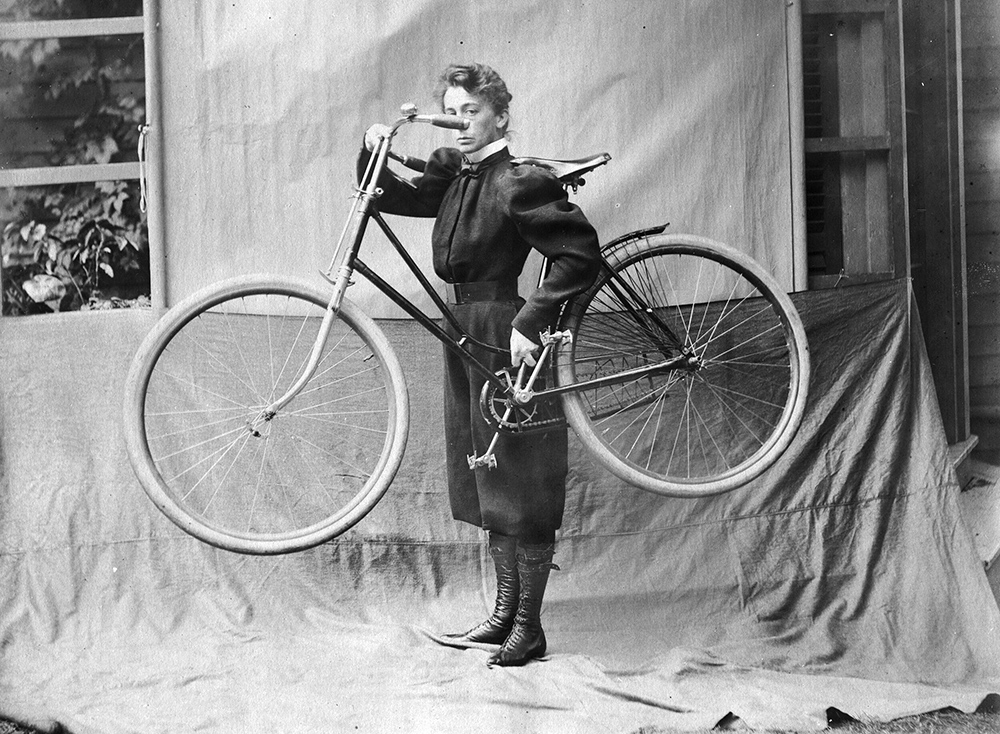
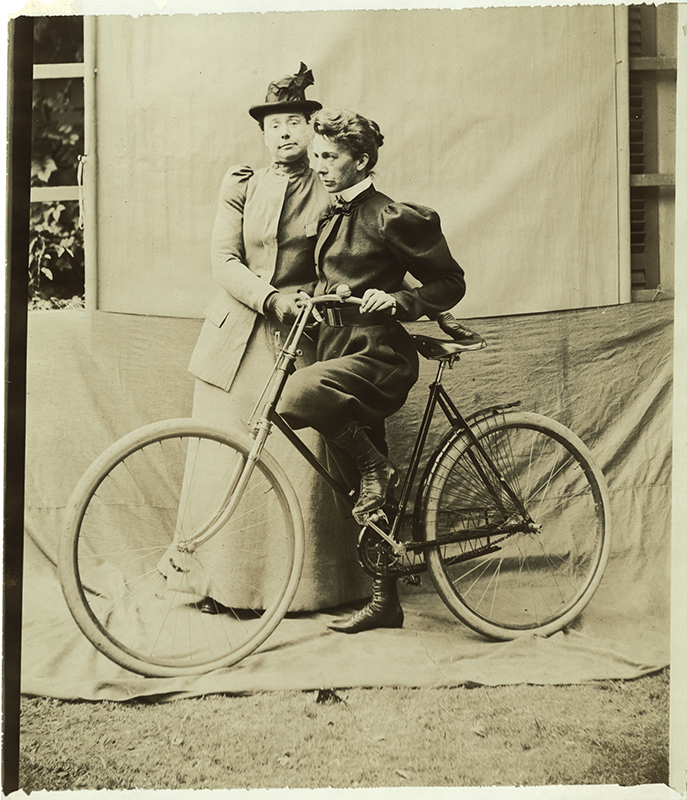
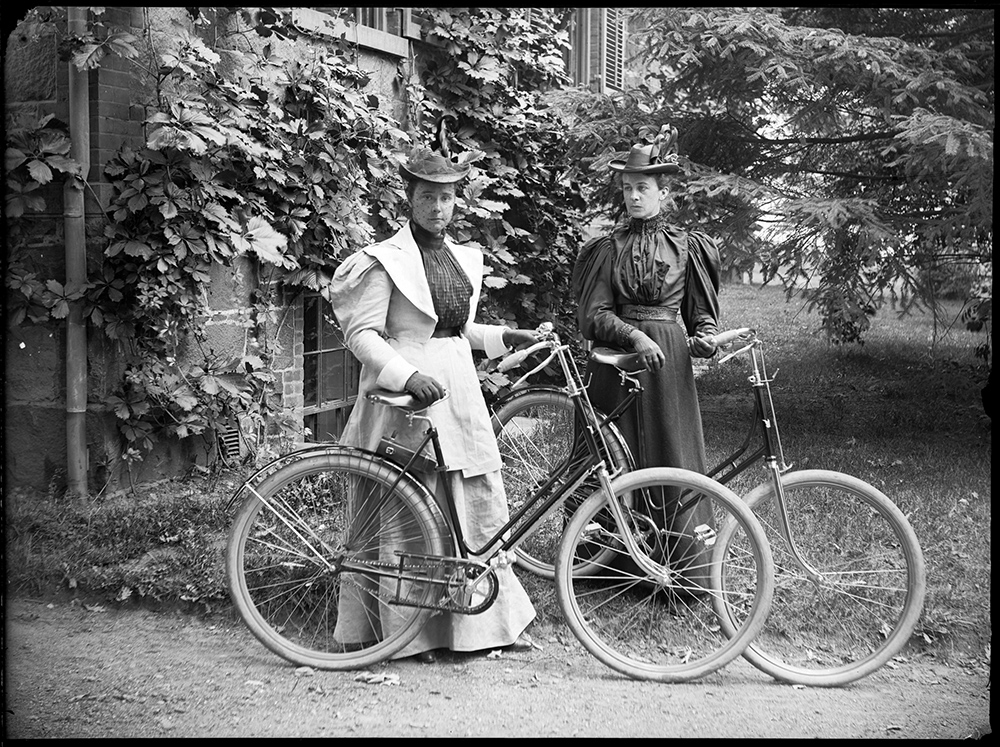
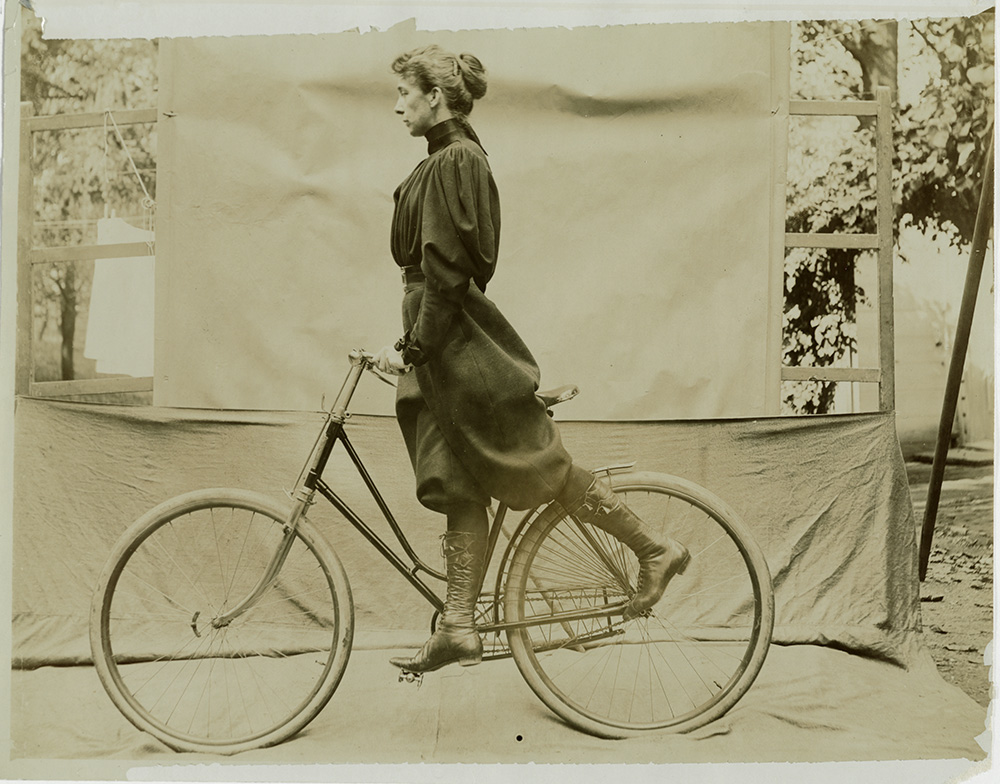
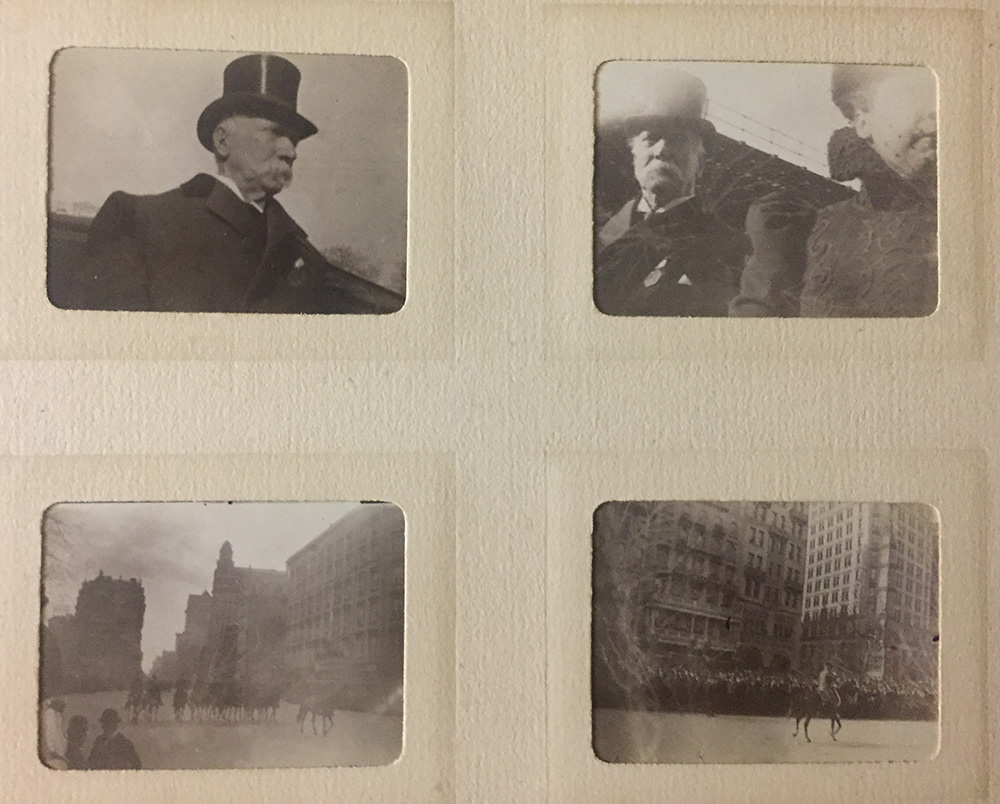
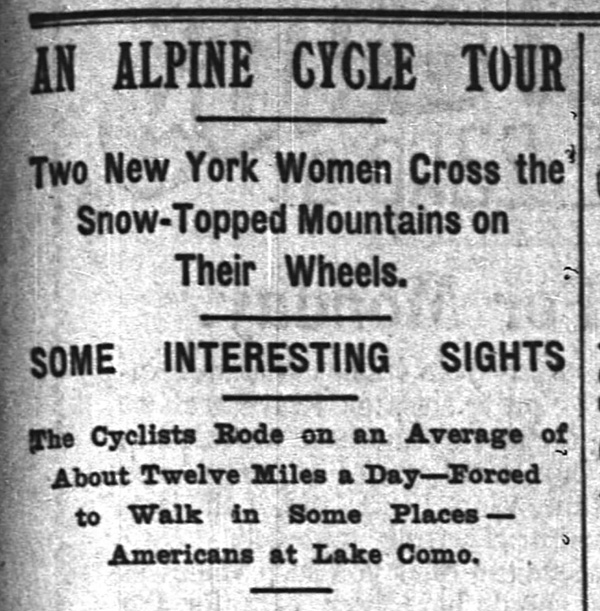
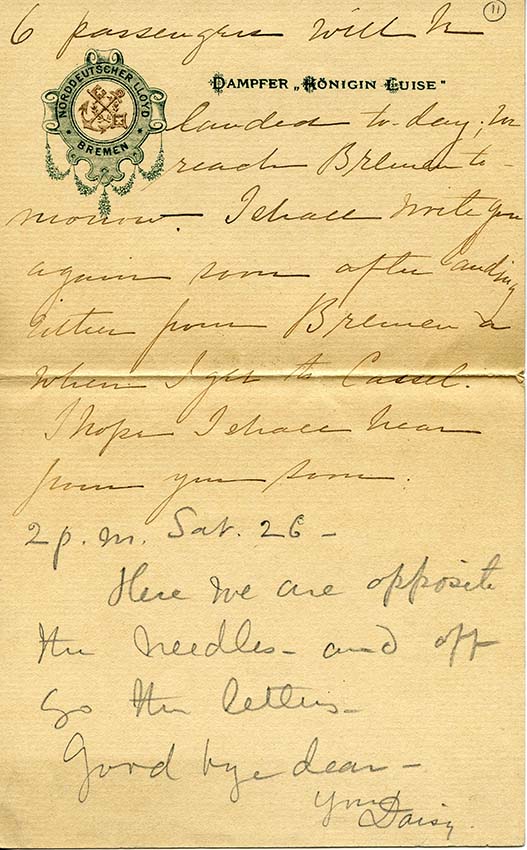
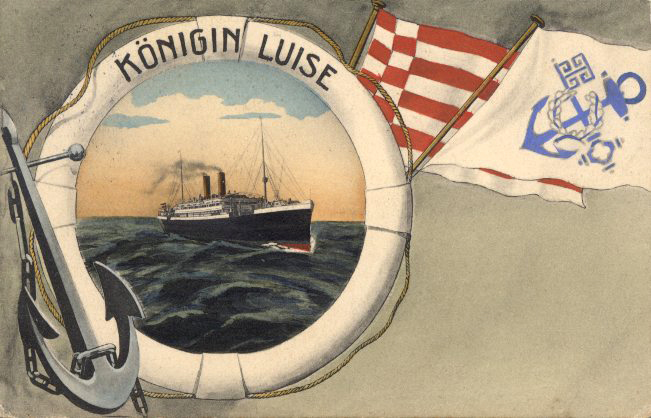
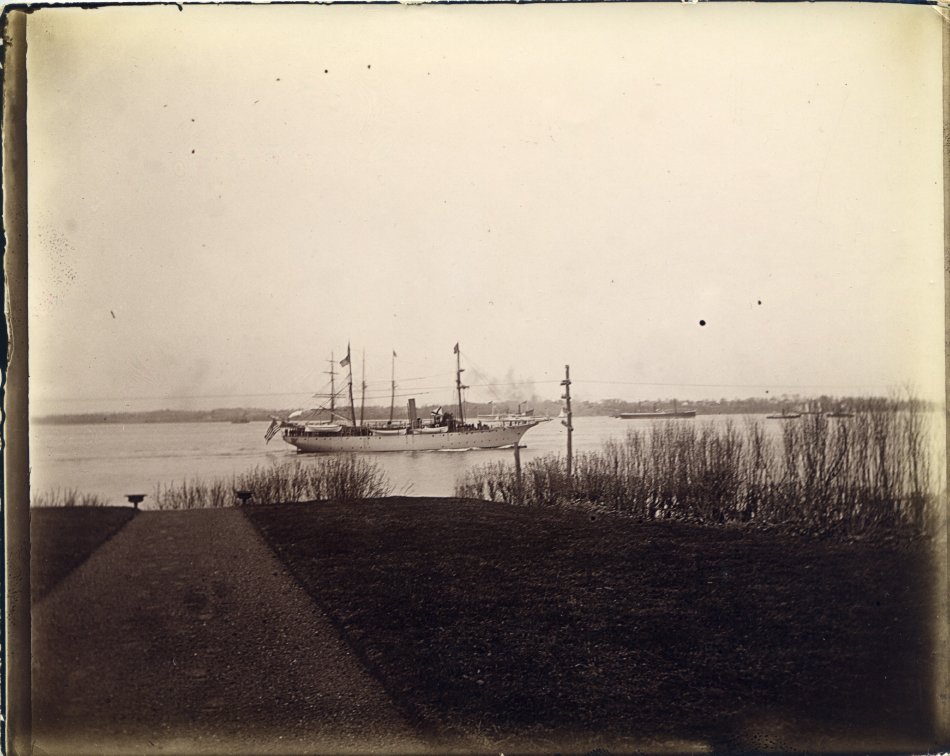
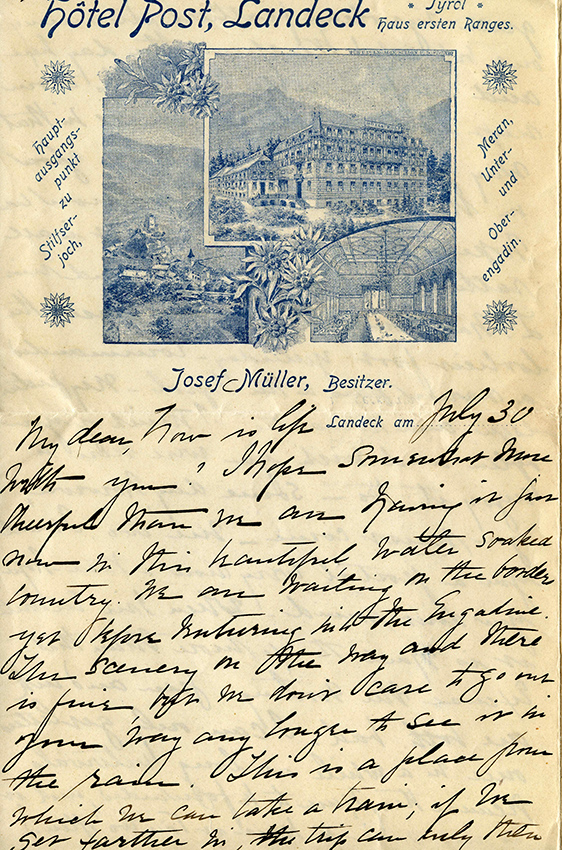
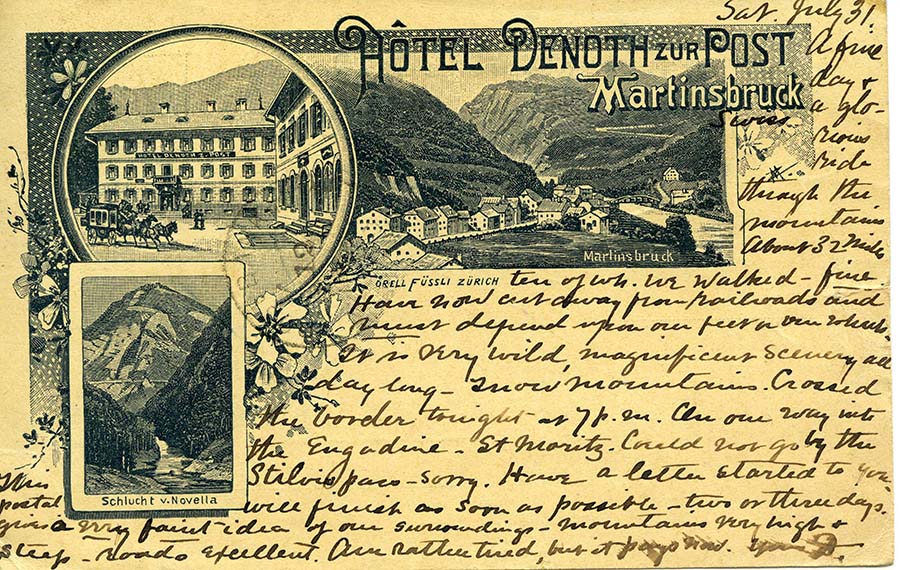
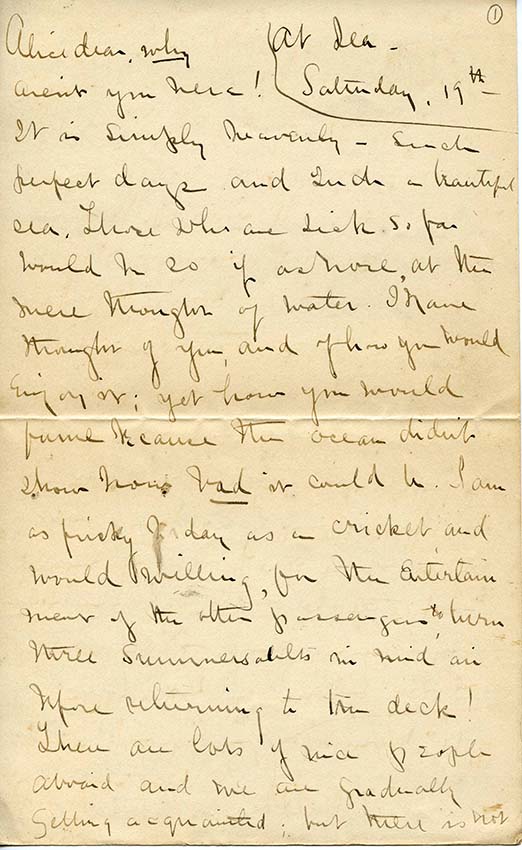
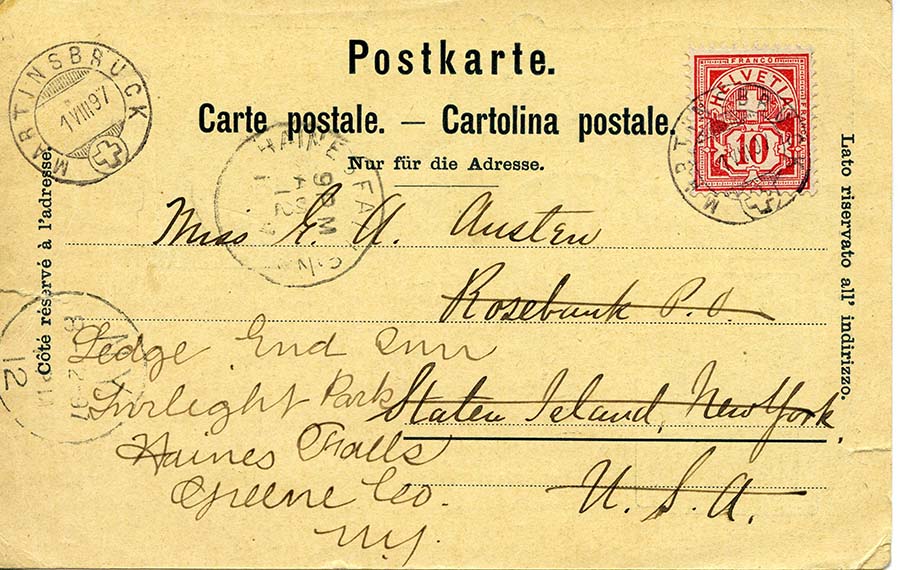
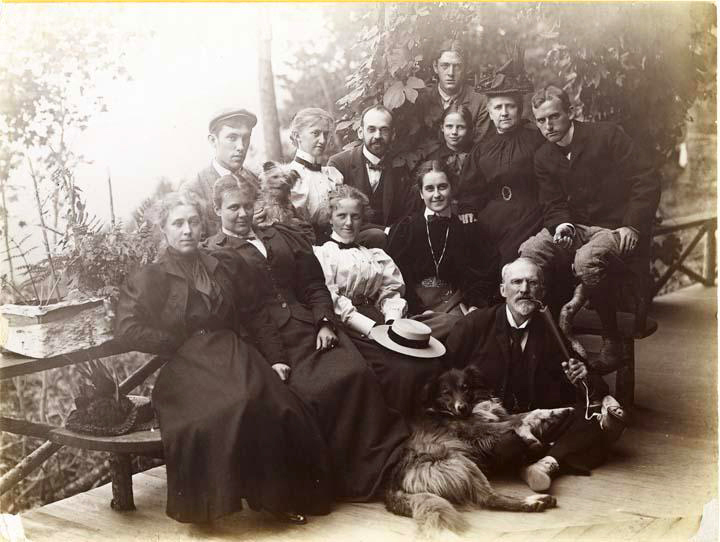
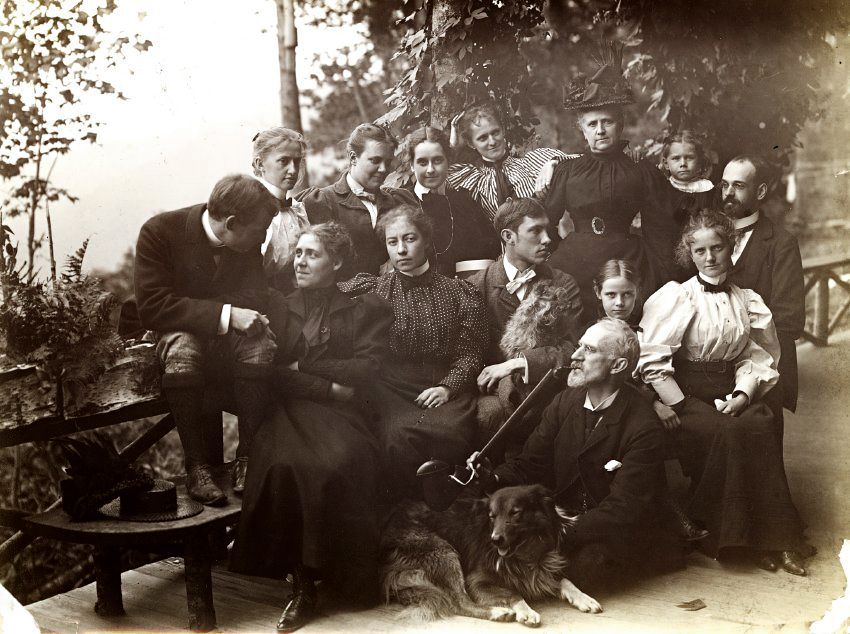
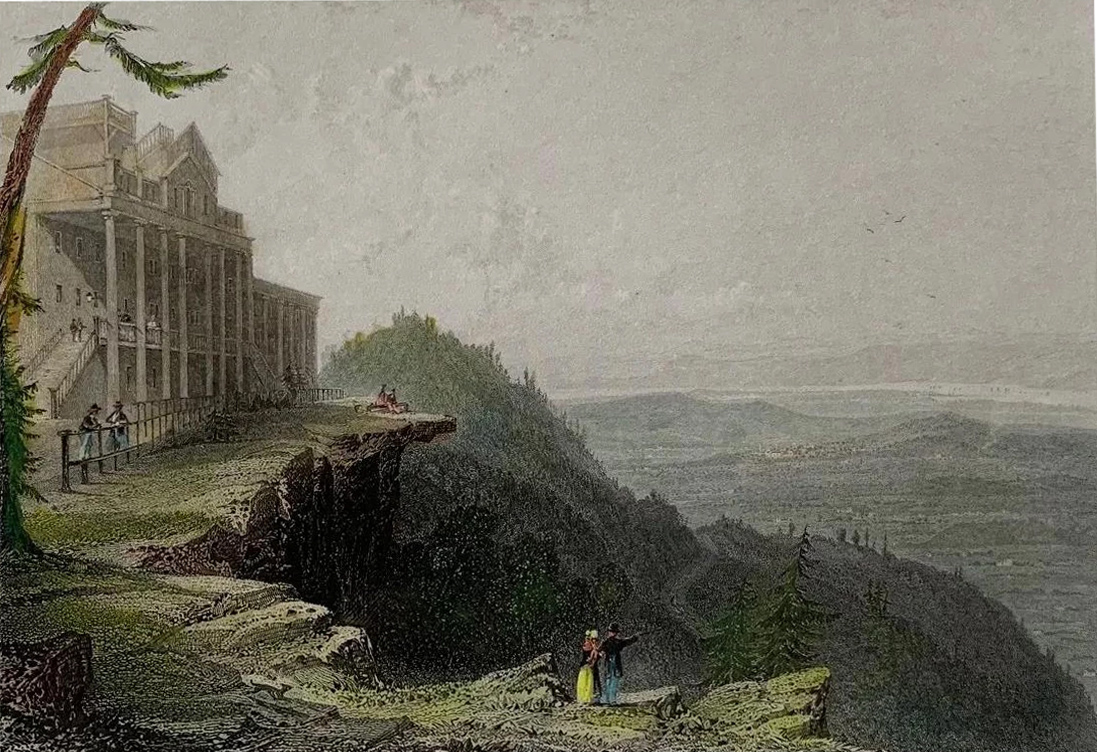
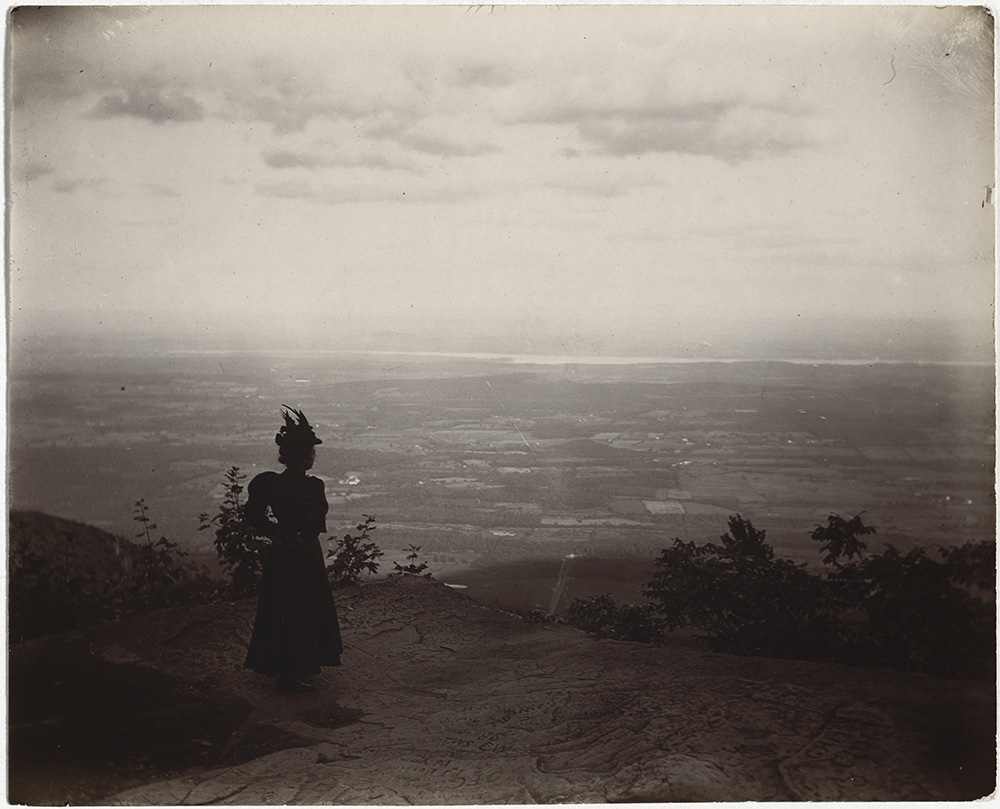
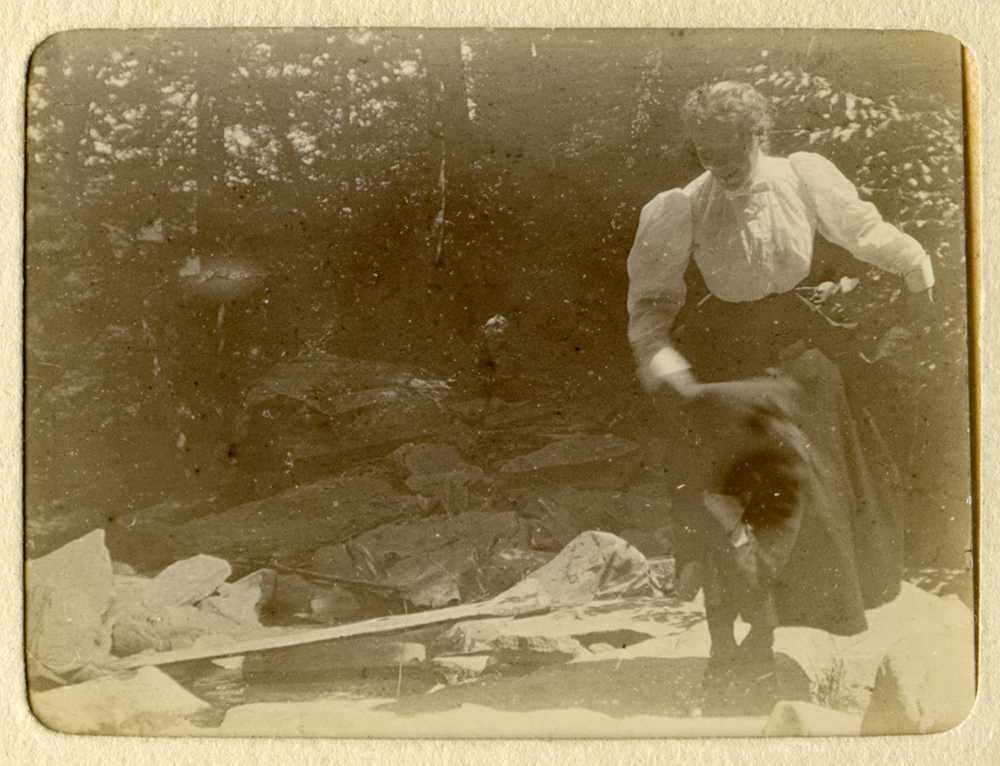
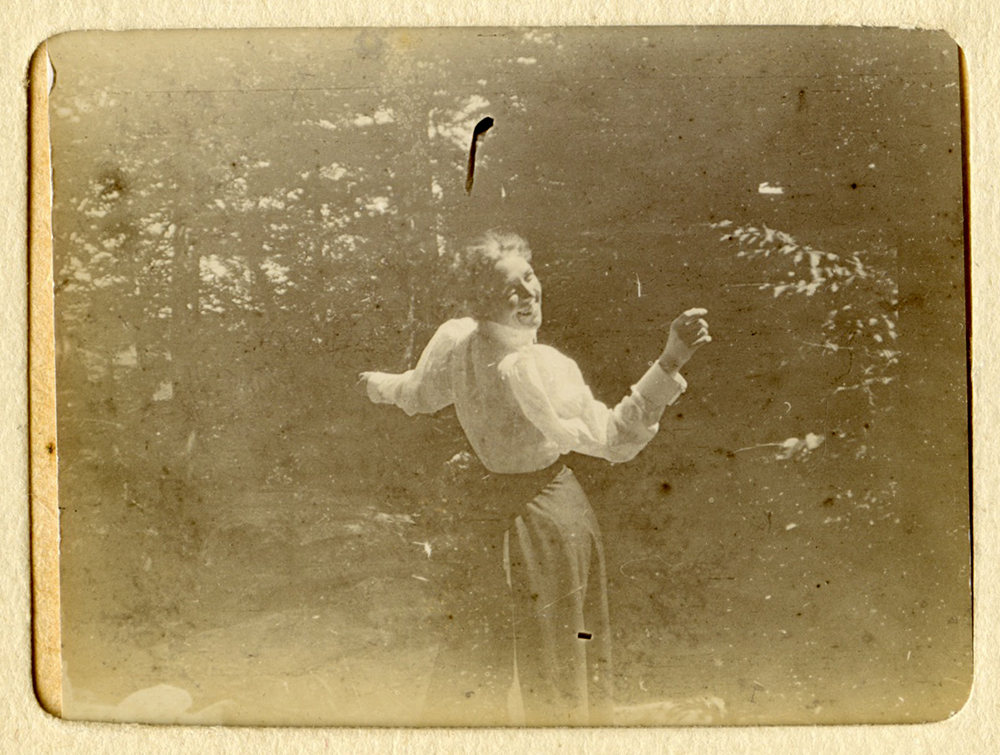
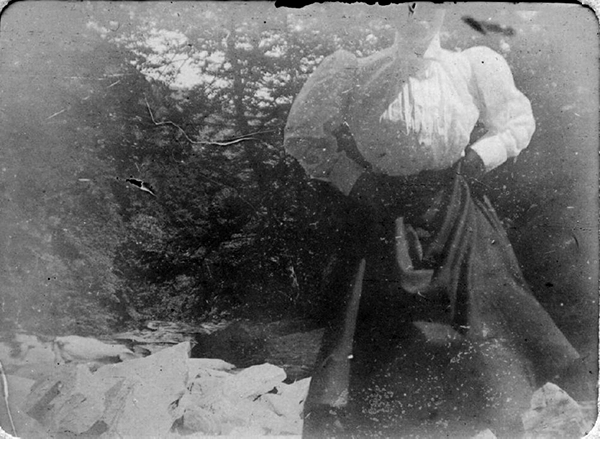
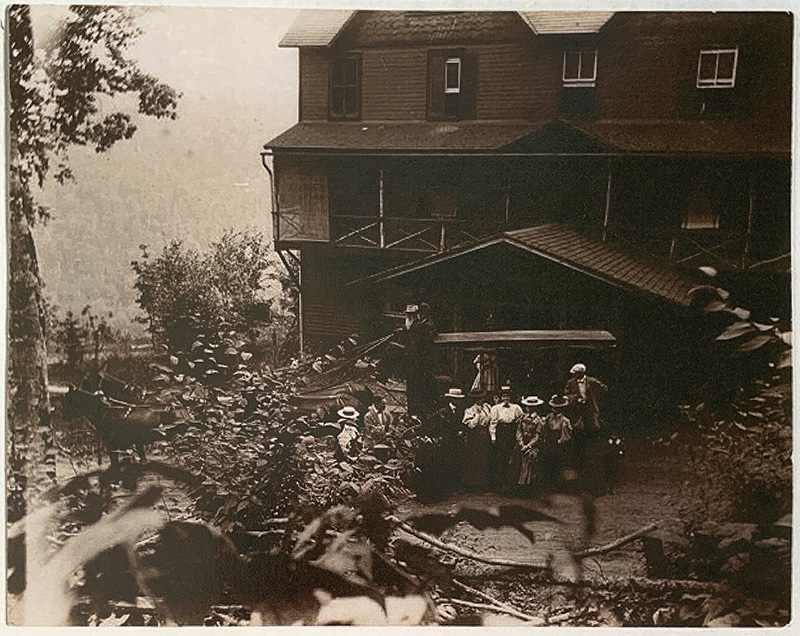
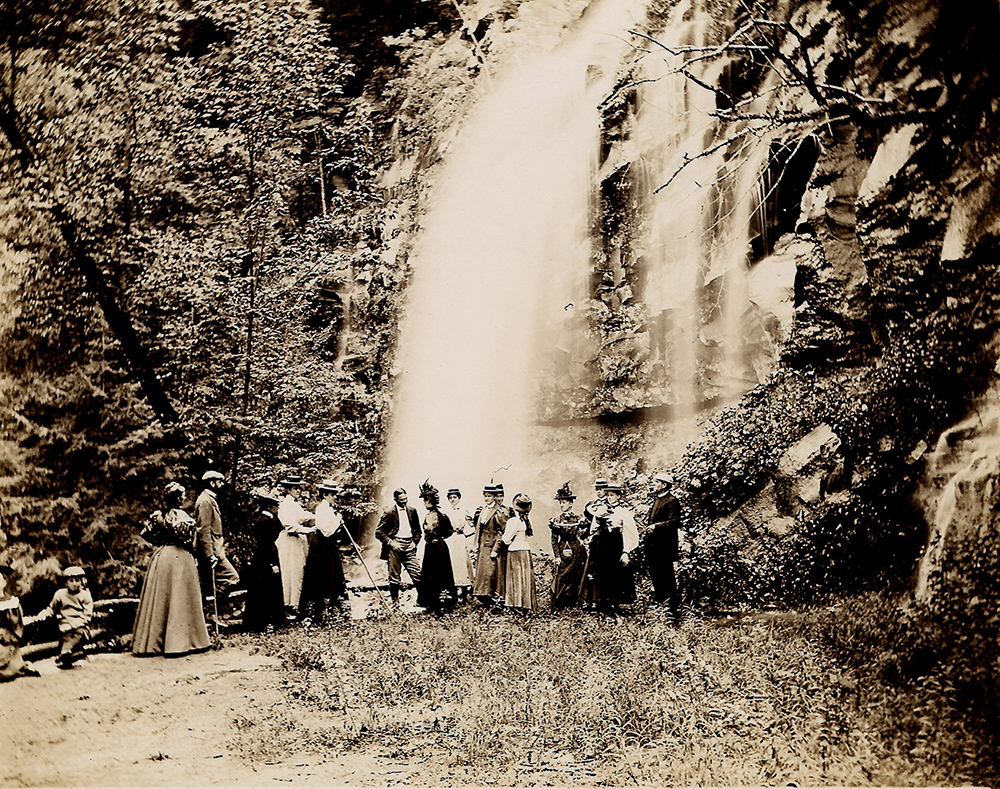
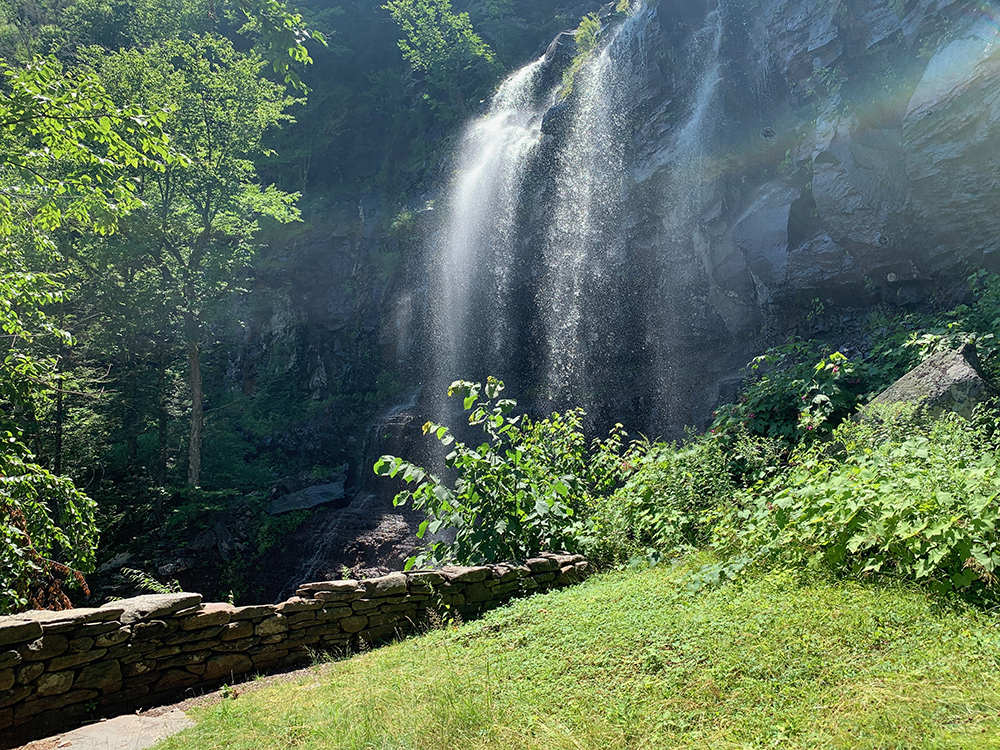
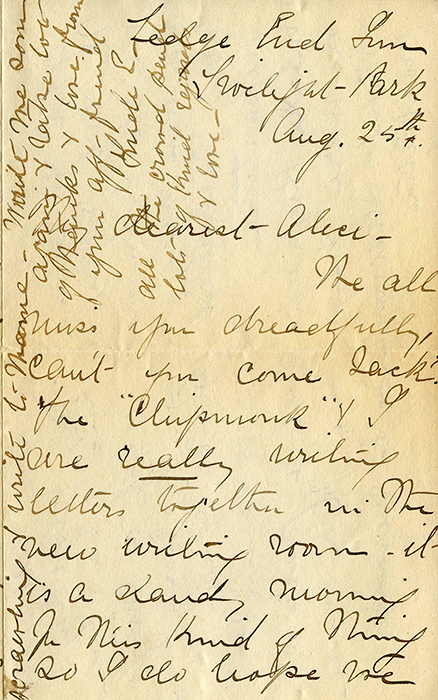
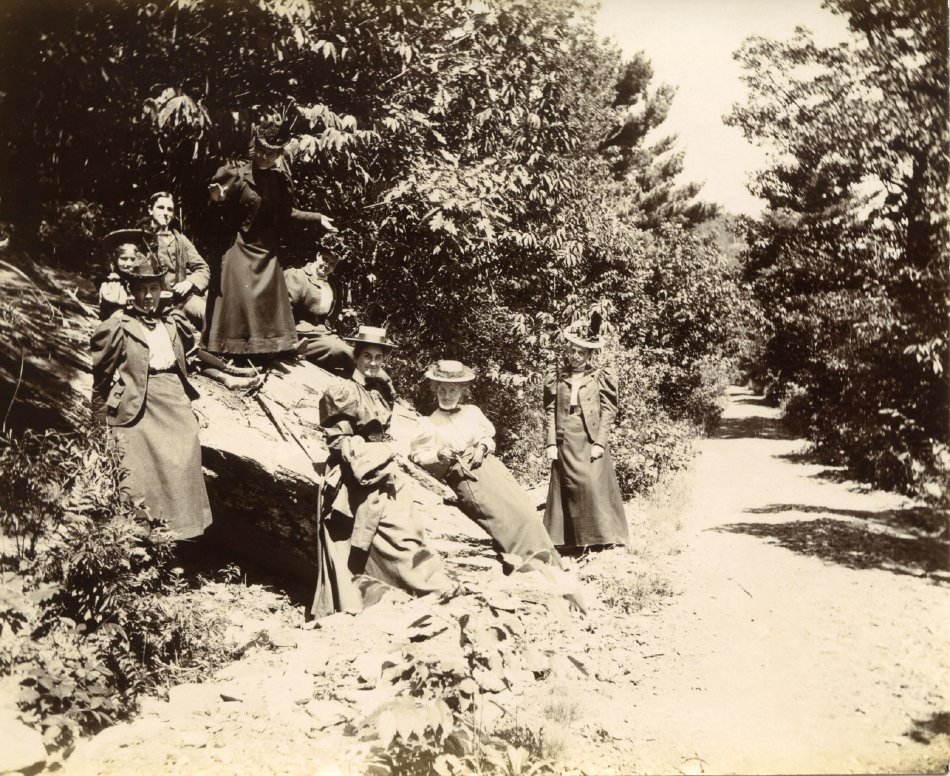
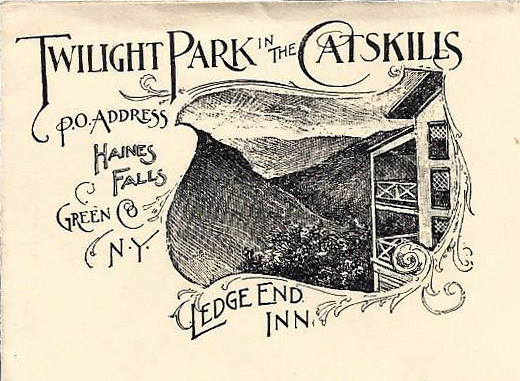
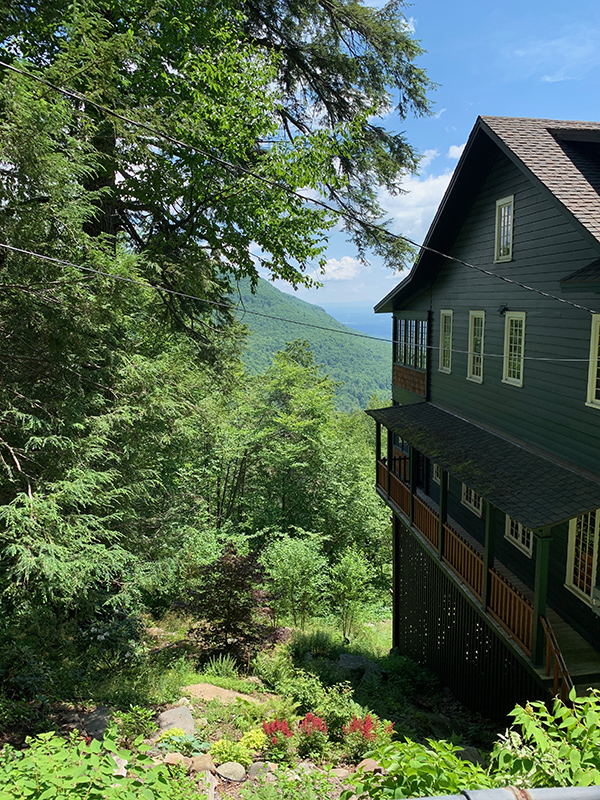
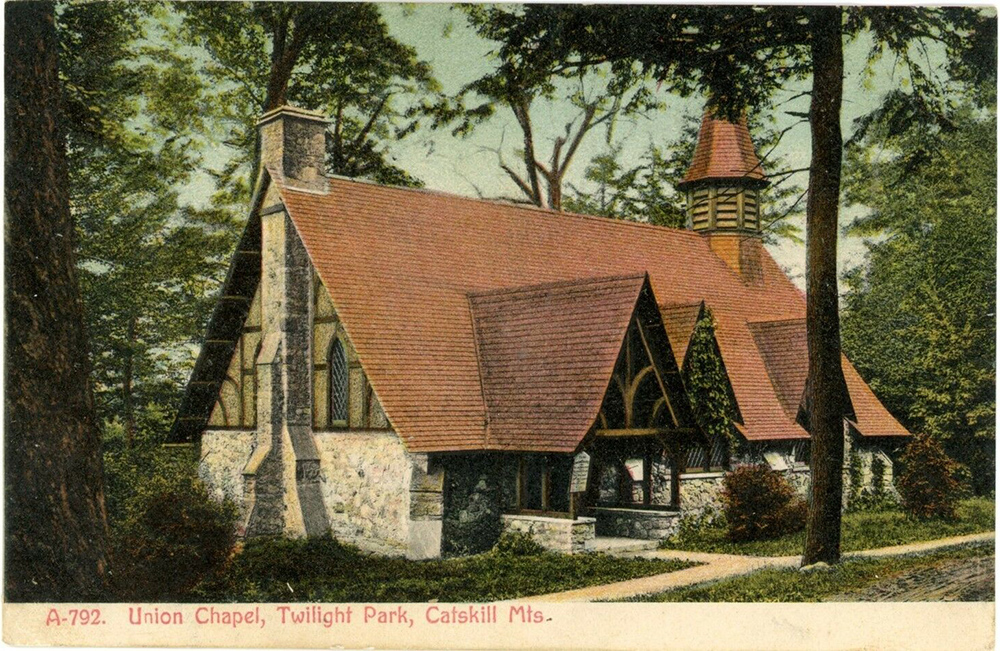
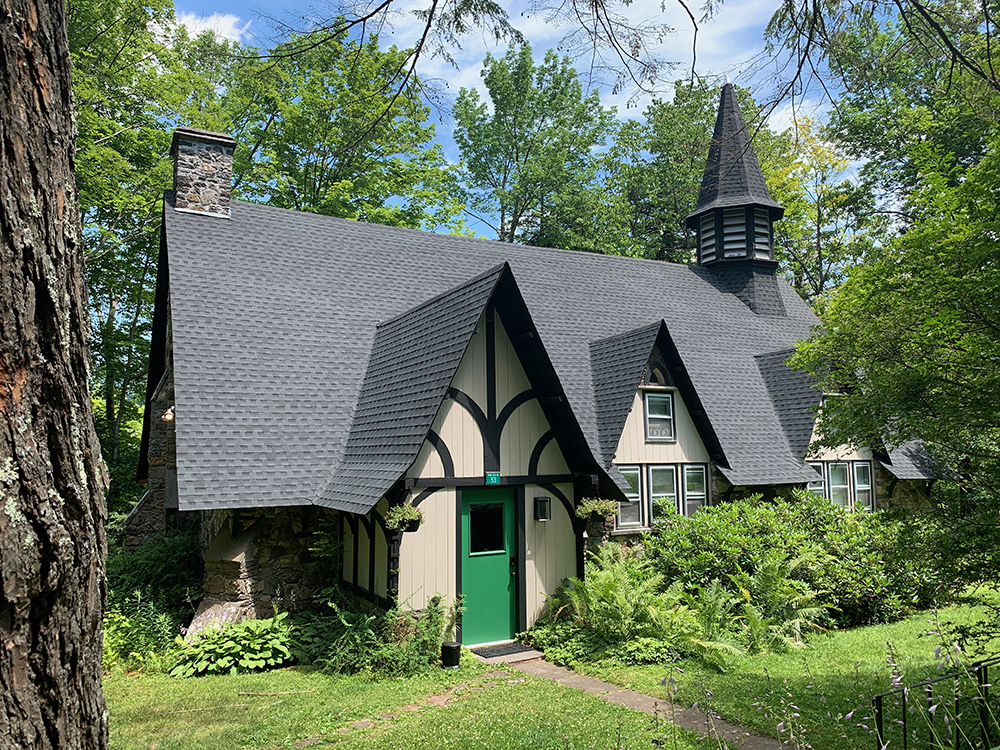
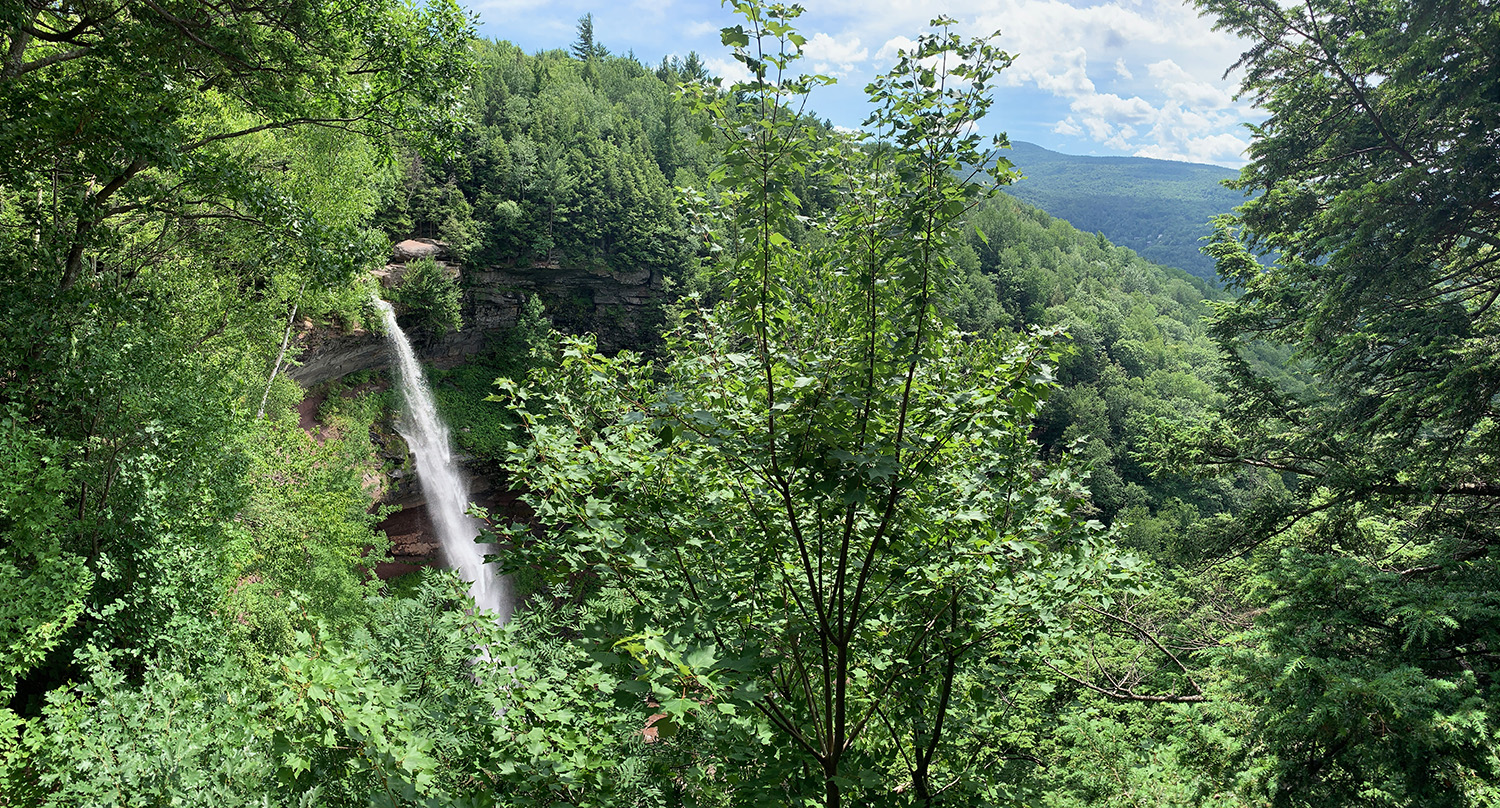

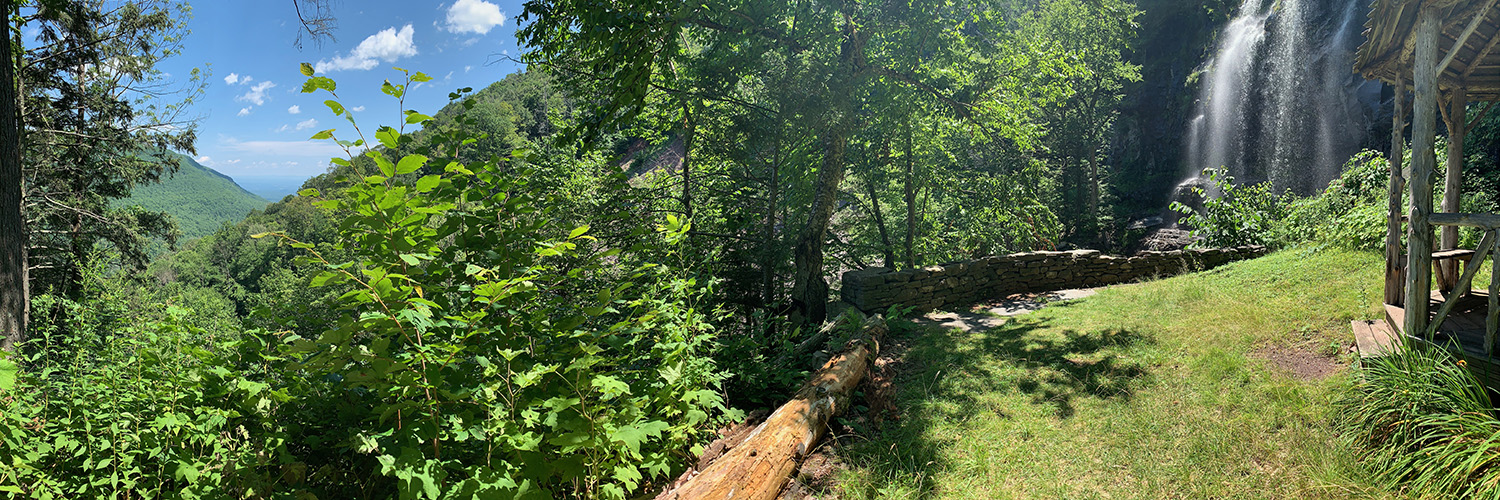
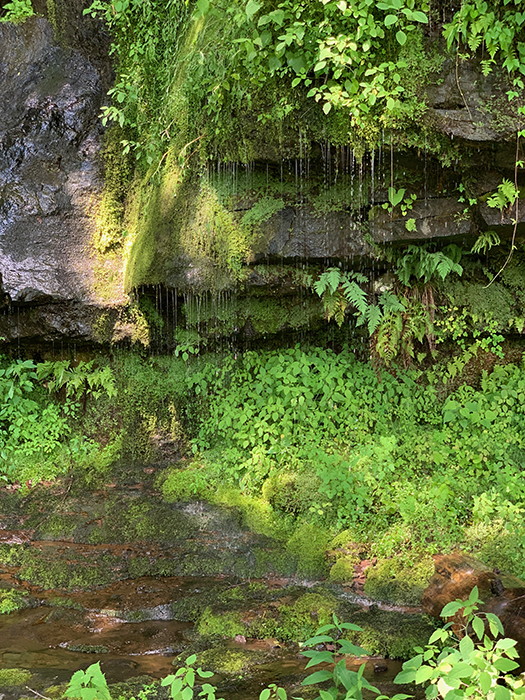
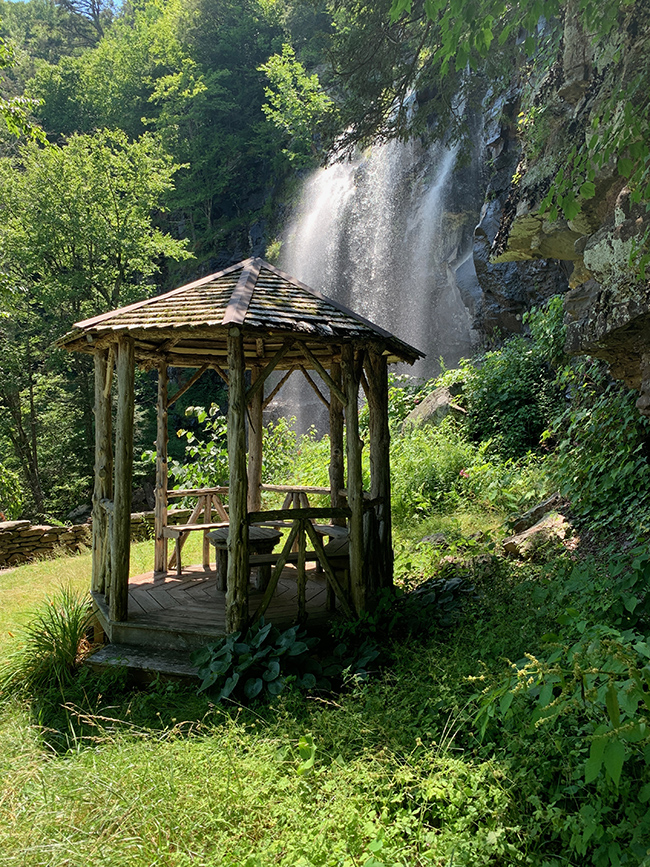
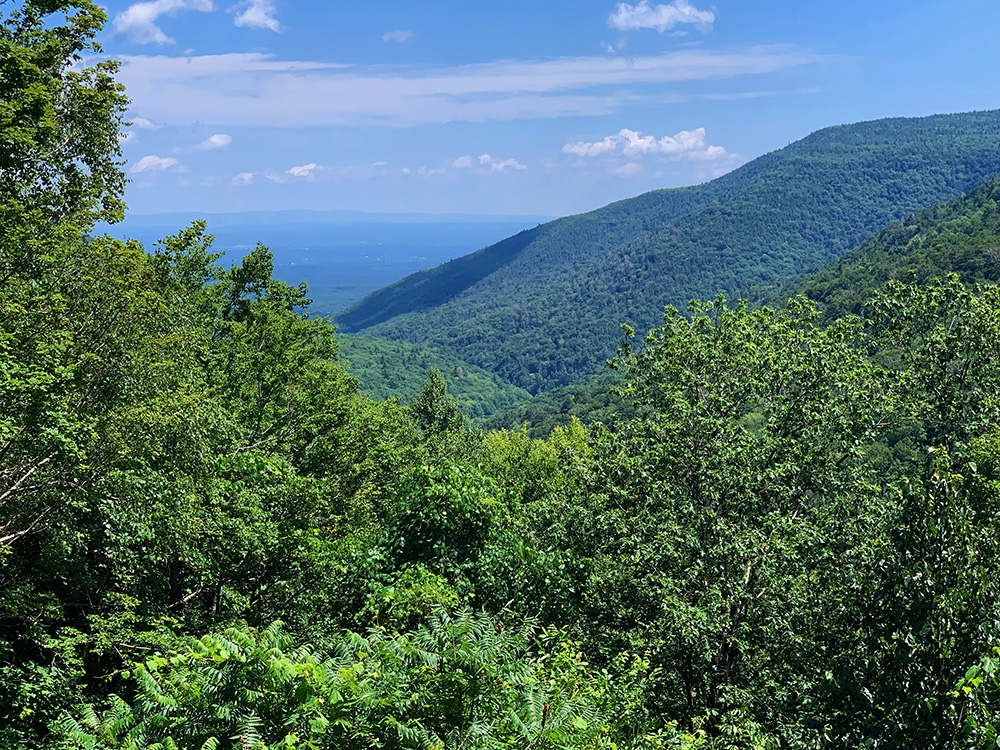

 Visit Podcast Website
Visit Podcast Website RSS Podcast Feed
RSS Podcast Feed Subscribe
Subscribe
 Add to MyCast
Add to MyCast